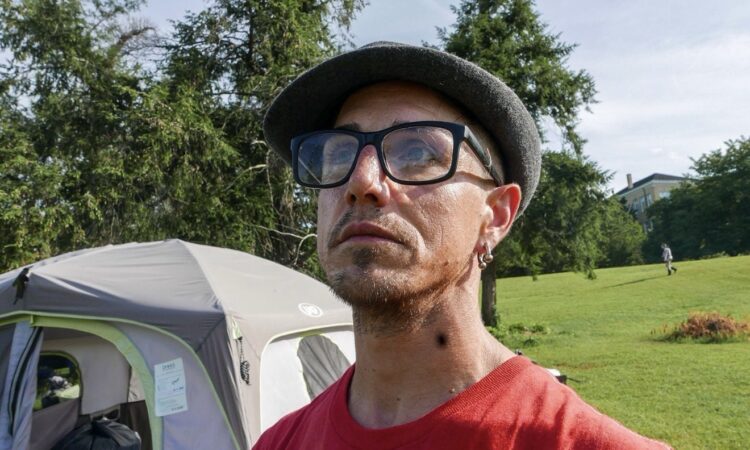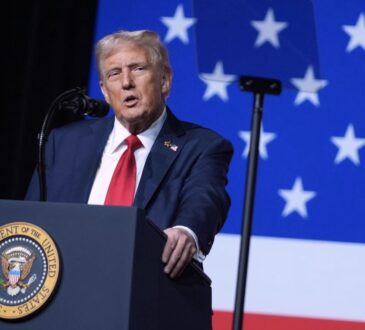Trump Went After Washington’s Most Vulnerable Population. Here’s What Happened to Them After the Cameras Moved On

Here are the stories of six people whose lives were turned upside down when Donald Trump and officials in Washington, D.C., began forcing people to stop sleeping outside.
Jesse Wall had been living in a tent when Trump shared a photo of it online and said the homeless needed to leave “immediately.” A few days later, Jesse’s tent and belongings were cleared out. He had been through this kind of thing before, but this time felt worse—it was public and humiliating. After spending a night in a hotel paid for by a mutual aid group, he was back outside, sleeping at the Pentagon before being told to leave again. Now, he lives in a patch of grass and travels into D.C. for meals and services. He misses simple things, like his pillows, and says the repeated evictions make him feel invisible.
Meghann Abraham was living in a tent with her boyfriend near Washington Circle, close to the services she used daily. One day, while talking to her dad on the phone—who had just read that the FBI had been to her tent—police showed up. They told her, “We’re clearing all this up today.” She had to quickly decide what to carry and what to leave behind. A month and a half later, Meghann and her boyfriend are now living far from the city, deep in the woods. The social programs she depends on are a two-hour bus ride away, and the community she trusted is scattered. She lost most of her belongings during another sweep soon after. Among the items she misses most are her clothes, which helped her feel like herself. Now, she says, “I’m walking around looking like a bum because I’m wearing bum clothes.”
David Beatty, a Catholic who believes in helping others, has also been affected. After the sweeps, he threw away his tent and now sleeps under a metro station overhang. He says putting up a tent doesn’t feel safe anymore because it’s likely to be taken away. He spends his days cleaning up outside a church and has given up on trying to keep a shelter.
Jeff Padgett came back to D.C. this summer with his dogs, Puppet and Luna. He was cautious about setting up a tent in the city, so he stayed across the bridge in Virginia. After giving an interview to CNN, he came back to find his tent and belongings gone. Important personal items, food, and his dogs’ supplies had disappeared. He doesn’t know if they were taken by police or stolen. The loss caused his dog to have seizures, and he had to skip meals to take care of them. Jeff, who is battling cancer and back problems, used most of his Social Security check to replace what he lost and is unsure how he’ll make it through the rest of the month.
G., who’s experienced about eight camp clearings in the last year, also lost his things again in August. He had to give up tools, bikes, and personal items over time. Though he was offered a bed in a new shelter, he turned it down because they only allowed him to bring two bags. G. has been waiting over a year for housing, but the process has stalled—his latest apartment didn’t pass inspection because the fridge light was out.
Wall has also been trying to get housing. He’s seen more than 20 apartments, but many failed inspections or landlords refused to rent to him. On the day his camp was cleared, he missed a promising apartment tour. Luckily, his housing voucher was extended, but the constant disruptions have made things harder.
Daniel Kingery lived in a homemade shelter outside a metro station. After a woman who’d been displaced by a previous sweep set up next to him, the city told him his place would be cleared. On the day of the sweep, he refused to leave and challenged the officers to explain their authority. Eventually, five officers physically removed him, pinned him down, and handcuffed him under the claim that they were taking him for a mental health evaluation. Later that day, the hospital released him, and he returned to his corner to find everything he had built destroyed—except for a few items saved by outreach workers. All he had left were the clothes he was wearing and the bruises on his back.
These six people, and many others, were swept up in a government effort that used homelessness to justify a show of force. Trump said it was about public safety, but for those affected, it didn’t solve anything—it just pushed them further into the margins. They lost their homes, belongings, safety, and sense of stability. None of them are closer to getting permanent housing. They’re still outside, trying to survive, long after the headlines have moved on.




